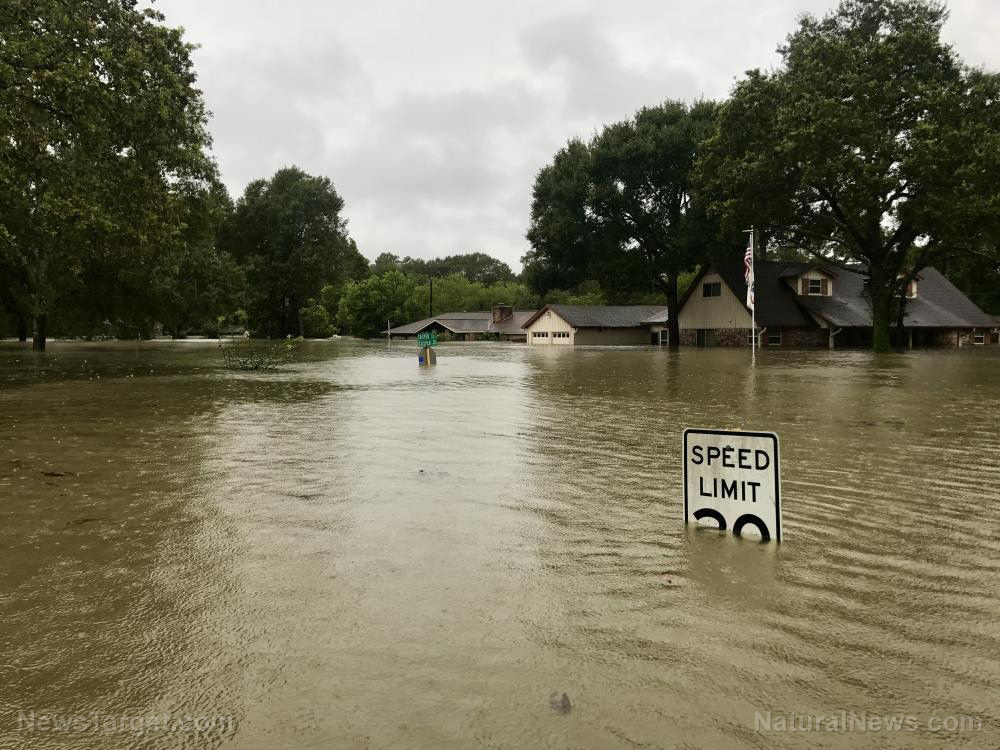Austin Fire Chief Joel Baker faces backlash over delayed flood response amid statewide safety scrutiny
07/08/2025 / By Willow Tohi

- Austin Fire Chief Joel G. Baker denied initial deployment requests for flood-stricken Kerrville, facing accusations of prioritizing budget concerns over lives.
- Over 100 deaths reported in Central Texas flooding, including a military vehicle accident in Fort Hood that killed five service members.
- Austin firefighters union initiates a vote of no confidence against Baker, citing “egregious dereliction of duty.”
- Water safety oversight failures, akin to Flint’s crisis, now under scrutiny as communities question systemic preparedness.
- State-wide coordination gaps in disaster response highlighted amid controversies over leadership accountability.
Over 100 lives lost, 850 rescued and two dozen children among the dead. As Texas grapples with the aftermath of catastrophic flooding, a bitter clash has erupted over leadership decisions that critics claim cost lives. On July 2 and 4, Austin firefighters, internationally renowned for their swiftwater rescue expertise, were twice denied permission to deploy to flood-stricken Kerrville by Fire Chief Joel G. Baker. The Austin Firefighters Association (AFA) accused Baker of placing financial concerns above human lives, as federal reimbursements would have covered deployment costs. “LIVES WERE VERY LIKELY LOST BECAUSE OF CHIEF BAKER’S DECISION!” declared the union in a scathing social media post.
“Dereliction of duty” or prudent resource management?
The conflict centers on the timing and scale of the Austin Fire Department’s (AFD) response. By AFD’s own measures, its Special Operations teams are among the most elite in Texas, with specialized training in submerged vehicle rescues and rapid flood deployment. Despite state emergency orders and two formal requests from rescue crews, Baker delayed sending personnel. Only three rescue swimmers were deployed on July 4, while boats and swiftwater teams remained grounded until July 7.
“It is unforgivable that a fire chief would NOT allow highly trained firefighters to answer the call to save lives,” said Bob Nicks of the AFA, alleging Baker misunderstood reimbursement policies. Texas law requires state-funded reimbursements for first-responder redeployment, yet the chief maintained the decision hinged on balancing resources for neighboring areas and Austin’s potential needs. “We must reserve staff locally given this storm’s unpredictability,” Baker stated, explaining delayed deployments included eight personnel only by July 6.
Critics counter that Austin’s centralized expertise put the city in a unique position to lead relief efforts. “We were forced to stand down and lives were lost,” said Nicks, with the AFA organizing a July 8 “no confidence” vote for Baker.
A pattern of disregard? Water safety failures and military losses deepen trust gaps
This crisis echoes broader concerns about emergency oversight, from water safety negligence—a pattern dating back to Flint, Michigan—to recent military tragedies. In Fort Hood, central Texas, the Army mourned five soldiers killed when their vehicle collided on rain-slicked roads near a flooded creek. Meanwhile, separate investigations into water safety protocols reveal allegations of lax inspections nationwide, undermining cash-strapped communities’ trust in official warnings.
“Flint made everyone question public guarantees. Now, when warnings come, communities ask, who can we trust?” remarked one emergency policy analyst. In Austin, the union’s public shaming of Baker suggests a wider distrust of leadership when lives hang in the balance.
The cost of delay in an unfolding crisis
The stakes have never been higher. Climate models predict more frequent, severe disasters, yet public agencies grapple with outdated resources and bureaucratic friction. In Austin, where summer flash floods test even the best-prepared systems, Baker’s reticence strains credulity for firefighters who argued they were ready “before the waters began to rise.”
Historically, flood response lag often compounds casualties. During Kerrville’s deluge, officials described “historic water levels” and told FOX 7 Austin that 10 girls and a counselor from Camp Mystic remain missing. “This isn’t just about Kerrville—it’s a warning shot for every community,” said AFA president Steve Ciudad. “If we can’t act when the window exists, when will we?”
A democracy test in disaster
This Texas tempest forces a reckoning: Who bears the responsibility when leadership hesitates? For Austin firefighters, the choice is stark—remove Baker or risk repeating his “cost over human” calculus. For policymakers, it demands systemic scrutiny of water safety and compensation policies that pit dollars against lives. As recovery continues, accountability vows ring loud. “We’re committed to shaking up complacency,” declared Nicks, “so when the next flood comes, ‘no confidence’ in leadership stops being an option—and starts being a fact.”
Sources for this article include:
Submit a correction >>
Tagged Under:
big government, catastrophic flooding, disaster, disaster response, emergency management, fire department, firefighters, government debt, great texan, Texas, tragedy, water rescue
This article may contain statements that reflect the opinion of the author
RECENT NEWS & ARTICLES
COPYRIGHT © 2017 COLLAPSE.NEWS
All content posted on this site is protected under Free Speech. Collapse.news is not responsible for content written by contributing authors. The information on this site is provided for educational and entertainment purposes only. It is not intended as a substitute for professional advice of any kind. Collapse.news assumes no responsibility for the use or misuse of this material. All trademarks, registered trademarks and service marks mentioned on this site are the property of their respective owners.





















